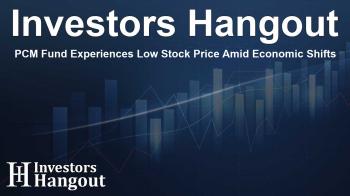PCM Fund Experiences Low Stock Price Amid Economic Shifts

PCM Fund Inc. Stock Hits 52-Week Low Amid Market Challenges
PCM Fund Inc. (PCM) has reached a significant milestone in its stock journey, hitting a 52-week low at $6.5. This decline highlights the broader economic uncertainties that investors are currently facing. However, it's important to note that even with this downturn, PCM Fund continues to impress with its robust 11.5% dividend yield, a hallmark of its strong performance over the years.
Enduring Dividend Payments
The company has a rich history of consistent dividend payments, having maintained this record for 33 consecutive years. This long-standing commitment to returning value to shareholders stands as a testament to PCM's operational stability, regardless of market volatility. Investors consider such a reliable payout to be a critical factor, especially during challenging economic conditions.
Stock Performance Overview
Over the past year, the fund has struggled with a total return of -7.02%. This lack of growth, paired with the latest decline, reveals the pressures facing PCM Fund in the current fiscal environment. The price action seen recently acts as an indicator of the existing challenges, making analysts and investors watch closely for potential changes.
Technical Indicators and Market Insights
Market trends and technical indicators add layers of analysis to the fund's current standing. Reports suggest that PCM stock is showing signs of being in oversold territory, which could point to a potential rebound. With a beta of 0.82, the stock exhibits lower volatility compared to the overall market, indicating that it may be less susceptible to sharp market fluctuations. Investors remain vigilant, watching for predictive signs that could indicate whether PCM Fund is poised for a recovery or may experience further declines.
Investor Sentiment and Future Outlook
Investor sentiment significantly influences the future trajectory of PCM Fund. As many look for signs of a turnaround, the consistent dividend payments may provide a stabilizing effect during this period of uncertainty. Analysts emphasize the need to remain informed about broader market trends, as these can directly impact PCM's stock performance moving forward.
Frequently Asked Questions
What does it mean for PCM Fund to reach a 52-week low?
Reaching a 52-week low indicates that the stock is at its lowest price in a year, suggesting potential challenges or reduced investor confidence.
How long has PCM Fund been paying dividends?
PCM Fund has maintained dividend payments for an impressive 33 consecutive years, showcasing its commitment to returning value to shareholders.
What does a beta of 0.82 indicate?
A beta of 0.82 suggests that PCM Fund's stock is less volatile than the overall market, meaning it may not fluctuate as dramatically as broader market forces.
What is an oversold territory in stock trading?
Oversold territory refers to a situation where a stock has seen a significant decline in price, leading traders to believe that it may be undervalued and due for a rebound.
Is PCM Fund a good investment right now?
While PCM Fund has faced challenges recently, its strong dividend yield and stable payout history may still make it an attractive option for long-term investors.
About Investors Hangout
Investors Hangout is a leading online stock forum for financial discussion and learning, offering a wide range of free tools and resources. It draws in traders of all levels, who exchange market knowledge, investigate trading tactics, and keep an eye on industry developments in real time. Featuring financial articles, stock message boards, quotes, charts, company profiles, and live news updates. Through cooperative learning and a wealth of informational resources, it helps users from novices creating their first portfolios to experts honing their techniques. Join Investors Hangout today: https://investorshangout.com/
Disclaimer: The content of this article is solely for general informational purposes only; it does not represent legal, financial, or investment advice. Investors Hangout does not offer financial advice; the author is not a licensed financial advisor. Consult a qualified advisor before making any financial or investment decisions based on this article. The author's interpretation of publicly available data shapes the opinions presented here; as a result, they should not be taken as advice to purchase, sell, or hold any securities mentioned or any other investments. The author does not guarantee the accuracy, completeness, or timeliness of any material, providing it "as is." Information and market conditions may change; past performance is not indicative of future outcomes. If any of the material offered here is inaccurate, please contact us for corrections.
